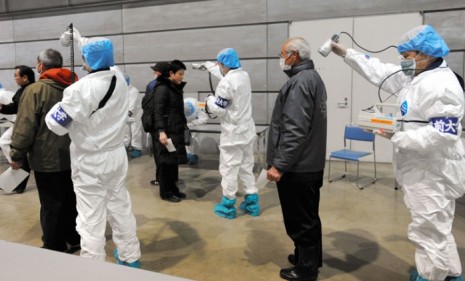Japan's next threat: Radioactive seawater?
Just when Japan's nuclear crisis looks to be settling down, authorities discover high levels of radiation in seawater off the shore of Fukushima

A free daily email with the biggest news stories of the day – and the best features from TheWeek.com
You are now subscribed
Your newsletter sign-up was successful
Japan's nuclear crisis looks to be under control for now, with a total meltdown at the damaged Fukushima nuclear plant no longer likely. But the country's exhausted authorities are now facing a fresh problem — rising levels of radiation in the seawater off the coast of northern Japan. Here, a quick guide to what could be Japan's next threat:
How radioactive is the seawater?
Extremely so, at least in the immediate vicinity of the Fukushima nuclear plant. The Tokyo Electric Power Company found that the level of radioactive iodine in water 1,100 feet from the plant was 126 times the legal amount, and cesium levels were 24 times higher than normal. Water tested some 10 miles away from the plant contained up to 16 times the legal level of radioactive elements.
The Week
Escape your echo chamber. Get the facts behind the news, plus analysis from multiple perspectives.

Sign up for The Week's Free Newsletters
From our morning news briefing to a weekly Good News Newsletter, get the best of The Week delivered directly to your inbox.
From our morning news briefing to a weekly Good News Newsletter, get the best of The Week delivered directly to your inbox.
How long will the water be radioactive?
Scientists say the radioactive iodine will break down naturally in the water, but cesium tends to linger for longer — and spread wider. After Chernobyl, the element cesium 137 was detected in wild animals as far away as Croatia and Norway, some 15 years after the meltdown. Scientists worry that cesium could get into the food chain of Japan's marine life, and stay there for years.
What would be the impact on Japan's fishing industry?
It could be enormous. Tokyo's $5.4 billion fish market is the world's largest, and it's already reeling in the aftermath of the disaster. Many fishing centers in the north of the country were all but wiped out by the quake and tsunami. Now, customers are refusing to buy fish from anywhere in the region, due to potential contamination.
A free daily email with the biggest news stories of the day – and the best features from TheWeek.com
What do the authorities say?
They're trying to put a brave face on it. "There are no fish coming from the regions that were hit, so no fish are contaminated," said a spokesperson for the National Federation of Fisheries Cooperative Associations. "These kinds of rumors are the worst thing that could happen."
Are other food sources contaminated?
Yes. Four northern prefectures were forced to stop selling spinach and milk after high levels of radioactive iodine were detected. Although iodine decays quickly, it can be very harmful to humans and animals as it concentrates in the thyroid gland. Children who drank contaminated milk in the aftermath of the Chernobyl disaster later contracted an unusually high rate of thyroid cancer.
Sources: Christian Science Monitor, Wall St. Journal, New York Times, Reuters
-
 How the FCC’s ‘equal time’ rule works
How the FCC’s ‘equal time’ rule worksIn the Spotlight The law is at the heart of the Colbert-CBS conflict
-
 What is the endgame in the DHS shutdown?
What is the endgame in the DHS shutdown?Today’s Big Question Democrats want to rein in ICE’s immigration crackdown
-
 ‘Poor time management isn’t just an inconvenience’
‘Poor time management isn’t just an inconvenience’Instant Opinion Opinion, comment and editorials of the day